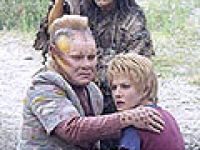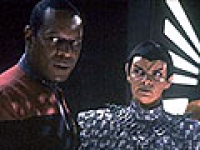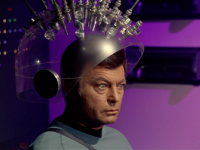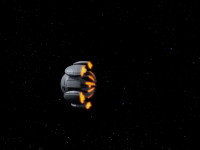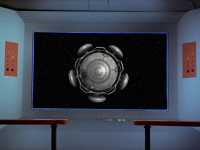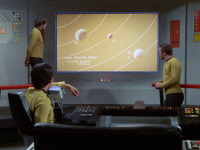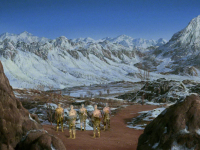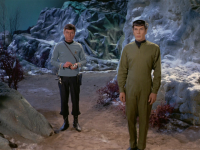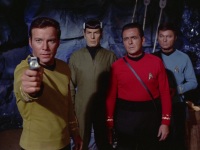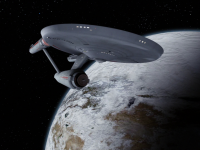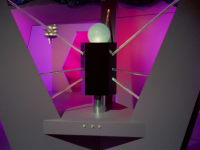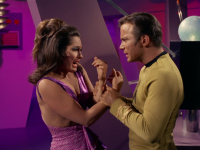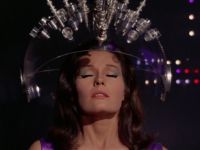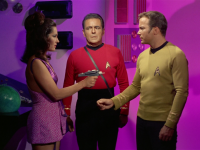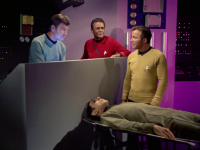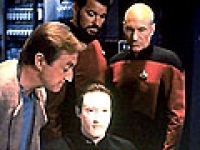Star Trek: Newest — 3x01 — That Hope Is You, Part 1
Synopsis
Arriving 930 years in the future, Burnham navigates a galaxy she no longer recognizes while searching for the rest of the U.S.S. Discovery crew.
Remarkable scenes
- Burnham desperately trying to soften her landing on the planet after emerging from the wormhole.
- Book telling Burnham about "The Burn."
- Burnham: "The Federation isn't just about ships and warp drive. It's about a vision and all those who believe in that vision."
- Book betraying Burnham.
- Burnham getting drugged.
- Book and Burnham escaping together in a rapid site to site transporter firefight.
Review
This is a fascinating episode given that its actual content is pretty good, but in the context of what has been an awful show up until this point, we can't just assess it on its own terms. If this were the pilot for a brand new Star Trek show set in the 32nd century where—for example—Burnham and the crew of an old ship wake up from stasis and discover the Federation had fallen in this manner, what we would have here is a very cool premise for a very interesting new Star Trek show. Indeed, if you just forget everything that happened in the past two seasons, this episode is pretty fun to watch! If we could rate this episode entirely on its own without the baggage of the previous seasons following it, then it would be worth considerably more points and an above average rating. A 7 out of 10 perhaps. But we can't do that. This isn't episode 1 of season 1 of a brand new Star Trek show, it's episode 1 of season 3 of a Star Trek show with a history that we have to take into consideration. And that history weighs down this otherwise interesting and well-made episode like an anchor.
For starters, rather than do something to take the implications of the time travel suit seriously or limit its superpowers in a way that is actually plausible, Burnham simply asks it to confirm the existence of life on the planet she crashed into—curiously without getting very specific about what kind of life, how much, or where—then inexplicably destroys the time travel suit, an extremely powerful piece of technology that could've helped her survive while marooned on a strange new world. It's as if the writers knew they couldn't keep such an overwrought device around for too long because it was too powerful a superpower, but were unable to imagine a clever way to limit its superpowers so they just blew it up and hoped we would forget about it. A better way to handle this would've been to say that the suit was damaged beyond repair. Then to fix the question of why they can't just build another one, they could perhaps say all the "time crystals" exploded right along with the dilithium crystals during The Burn. Or perhaps they were used up in the temporal war that took place a century or so ago. It's easy to button up superpowers if the writers are willing to put even the slightest effort into it. To their credit though, at least they did so with the portable transporter by making it require recharging time. Finally a limit to a superpower, at long last.
Another welcome development at long last is the narrative emphasis shifting away from mystery and towards suspense. We get a lot of exposition in this episode about why the Federation fell that is reasonably plausible and intriguing. Thankfully we won't have to spend all season this time piecing together just what is going on because the writers have finally figured out how to adhere to the principle of "show, don't tell." The specifics of the setting are well-conceived too. This takes place after the time of Federation timeships like from Voy: Relativity and after the time of Daniels from Star Trek: Enterprise, which could explain why the time travelers from that era aren't coming here to fix history. The temporal (hot) war that ensued after their time and the subsequent ban on time travel technology might preclude that deus ex machina, thankfully. Though it remains hard to understand why a ban on time travel technology would prevent a rogue actor from developing and using it anyway, particularly in a society as lawless and disordered as this one is, which makes Burnham's decision to destroy her time travel suit especially idiotic given that such technology would be an incredibly valuable thing to have in a time where it is rarer than expected or perhaps nonexistent.
A particular highlight of the episode was how well the writers thought through the consequences of The Burn, which they explain as a somewhat mysterious event that caused most dilithium everywhere to explode, killing countless people in a mass casualty event. We don't know if it was a natural disaster or some kind of terrifyingly-coordinated terrorist attack. We also don't know if it could happen again. But what was said to ensue was the complete collapse of the Federation and presumably most other governments as well—any nation that relied heavily on dilithium in their power reactors for ships or colonies. It is notable as well that not every ship or society is powered by dilithium, as we've seen quantum singularities power warp drives before, plus there's transwarp which may or may not be powered by dilithium, and quantum slipstream which is mentioned in this episode powered by benamite. Given that, plus not all the dilithium having actually been destroyed, what we see is a galaxy that has collapsed into considerable disorder, but is not fully crippled. Interstellar travel still exists, it's just a lot more expensive than it used to be. Though one annoying detail in how it's presented is when Book's ship is flying at warp, we get yet another new warp effect. This is especially frustrating given that the visual effect actually looks a lot like quantum slipstream from Voyager. Had they just replaced the lines referring to Burnham stealing dilithium on the commerce planet with benamite instead, the presentation of the visual canon would've been much more in alignment with past Star Trek shows. Though Discovery getting visual canon wrong almost goes without saying at this point...
Speaking of aesthetics, Discovery always felt like it was a story that should've been set in the far future to begin with. It's remarkable that the 32nd century doesn't look that much more futuristic than Discovery's first two seasons already did. Sure, we have some fancy new tactile computer interfaces, fancier portable transporters, some slightly different weapon designs, and quantum slipstream, once an unstable and experimental technology, now commonplace enough to be mentioned in casual conversation. But the differences being so subtle truly highlight what a mistake it was to set Discovery in the 23rd century at the start of the series. There are a handful of other aesthetic oddities too. Sahil appears to have the most boring life ever, living alone on an abandoned starbase getting choked up about flag-raising like a stereotype of someone's old, slightly unhinged, overly patriotic uncle. This came off less as reverence for the bygone days of a glorious era of infinite diversity in infinite combinations united under the Federation and more like a display of toxic nationalism or the rituals of a creepy cult. Burnham's dumb emotional scene at the start of the episode reciting her rank and serial number while she looked at her emergency rations pack had a similar vibe to it as well.
As a final and quite depressing note about this story, it's worth considering how the events of the "Short Trek" episode Calypso relate to the events of not only this episode, but this season and presumably the rest of the entire series. We know Calypso took place about 100 years after the time Burnham and presumably the Discovery crew now find themselves in, which means at some point in the future the Discovery will end up floating in space abandoned. It also means that even worse than that, memories of the Federation will have faded even further than they already have, given that Craft had no knowledge of the Federation and the future he came from remained quite dystopian 100 years after the events of this episode, this season, and presumably this entire series. That means unless something extraordinary happens to push Discovery even further into the future beyond Craft's time to give us a happy ending or Calypso is retconned, then the efforts of the crew of the Discovery since arriving in the future will have been all for naught given that just 100 years after their interventions in the timeline it is clear that they will have failed to restore the Federation or even the memory of it.
In essence, Calypso quite possibly foreshadows the end of Star Trek: Discovery as a story of a forgotten crew on a forgotten mission that served no purpose in the end since nothing they will do between now and 100 years from now will ever matter. It seems unlikely this was the writers' intent, but in some regards it's hard to imagine a more fitting ending for Discovery. Just as they unintentionally gave us ample reason to drop the series from the prime canon in season 2, now they're unintentionally giving us ample reason to believe that even in this alternate universe, none of what they're doing will age well, will be well-regarded by history, or ultimately end up mattering in any way whatsoever. Indeed, this was the predictable consequence of the lazy writing in the Calypso short itself, as was in fact predicted in the earlier Calypso review:
"[R]ather than give us answers to basic questions like who the unseen enemy 'V'draysh' is, how the Discovery was preserved perfectly for a thousand years but abandoned, or why so much of the Federation's history seems to have been forgotten by at least one human colony, the writers left all that intentionally vague out of an apparent desire to not 'get hemmed in by canon' or some other similar platitude that is often trotted out to defend stories with this kind of reckless disregard for the long term health of the franchise's canon."
"On the contrary, setting this story a thousand years into the future doesn't do a damn thing to prevent the writers from cornering themselves with canon. If anything, it's one of the worst settings imaginable for preventing future writers from being burdened by canon. Because of this episode, any Star Trek story set far enough into the future has to account for the apparent decline and possible fall of the Federation, or at least rationalize how Craft and his entire planet could be unaware of the Federation's existence."
"Constraining future Star Trek stories with this kind of baggage almost never goes well. We've seen what happens with poorly thought through exposition that saddles the franchise with long-term plot implications before. The 'warp speed' limit in TNG: Force of Nature was quietly forgotten. The absurd 'warp 10' drive that turns you into giant newts from Voy: Threshold was intentionally forgotten with prejudice. There are many examples. This episode's ambiguous proclamations about the Milky Way's future are not impossible to work into future stories, but will require future writers to be at least as clever as this episode's writers were lazy."
The ending for this Star Trek series has not been written yet, but it sure looks like the writers are on track to fail to be clever enough to reconcile past lazy choices with what will likely be yet another unearned happy ending, just like season 1's and season 2's. In fact, if Discovery does end without giving us reason to believe events after Calypso turn out well, then it will be quite reminiscent of the embarrassingly awful ending to Battlestar Galactica, which—among its many sins—argued that humanity settling on Pleistocene Earth circa ~150,000 years ago somehow constituted a happy ending when, as the review of it notes, "all our archaeological evidence suggests that the human race nearly went extinct not too long after our beloved colonists landed. The population may have even been reduced to a number as small as a few thousand. That means that along with the vast majority of the new primitive friends our delighted colonists made upon arrival, all the colonial survivors too were nearly wiped out not too long after they landed." It was a depressingly horrifying ending presented as a happy one by a clueless narrative. It sure seems like Discovery is walking that same path right now.
Star Trek: Newest — 3x01 — The Xindi
Synopsis
Captain Archer and his crew set out to gain information about the mysterious and antagonistic Xindi race.
Remarkable scenes
- The cargo containers bouncing off the walls.
- T'Pol: "Delicate is not a word I associate with Mr. Tucker."
- Tucker freaking out at the Xindi slave.
- The MACOs rescuing Archer and Trip.
Review
My primary complaint was addressed here. The Xindi aren't exactly as stupid as I originally thought. It seems the rather ill advised move (sending the prototype to Earth) I commented on in the problems section of the last episode was caused by the remarkable disunity of the Xindi council. The Xindi themselves are sufficiently interesting for a multi episode arc; their council reminded me somewhat of the Jedi council from the Star Wars films. It's remarkable how there can be five distinct species of Xindi, especially when it's a rarity for even two distinct species to be native to a single planet. Unfortunately, the episode itself was similarly flawed to Ent: The Expanse. I liked the Trellium-D mining complex though. The administrator was most amusing. What I disliked was Archer's bad attitude and especially the Vulcan neural pressure scenes. Somehow I doubt either will go away. Hopefully they can be presented with better taste in the future.
Star Trek: Newest — 3x01 — Basics, Part II
Synopsis
The crew fights for survival.
Remarkable scenes
- Tom in a damaged shuttle, destroying a Kazon patrol ship that attacked him.
- Janeway taking charge down on the planet, determined to keep everyone alive.
- The revelation that Seska's child was Culluh's and not Chakotay.
- The doctor: "I'm a doctor, not a counter insurgent." Count 15 for "I'm a doctor, not a (blah)" style lines, which McCoy was famous for.
- Chakotay: "Trapped on a barren planet and you're stuck with the only Indian in the universe who can't make fire by rubbing two sticks together."
- Janeway regarding seeing the erupting volcano spewing at them: "I think our top priority has just been dictated."
- Suder mass slaughtering Kazon.
Review
A hostile takeover plot is a fairly original one in Star Trek so far; the Enterprise D had been taken over, but covertly and far more briefly. This is the first episode to feature a battle in which the ship of the show is directly conquered and the crew put off the ship. As such, part one made for some very exciting story, though not without its flaws (see part 1 review), still exciting nonetheless. Now we have a story in which the cast is split up. Most of them are stuck on a primitive planet. Tom has a shuttle somewhere, the doctor is still aboard, hiding, as is Suder. Unfortunately, aside from the revelation that Chakotay was in fact not the father of Seska's child, nothing all that remarkable happens. Culluh and Seska are eventually fooled by the doctor, Suder, Paris, and the Talaxians. Suder's character is needlessly wasted, and the crew is reunited with the ship. The first part of this story unleashed so much potential that it seems like the rather adequate second part wasted some of it. Still, I enjoyed the episode. One detail to appreciate: the crew makes peace with the primitive people on the planet rather than waging war with them in the end. Very Trek-like. :)
Star Trek: Newest — 3x01 — The Search, Part I
Synopsis
Hoping to avert an invasion, Sisko takes his officers into the Gamma Quadrant on a dangerous mission to find the mysterious leaders of the Dominion.
Filler rating: not filler
Numerous major long term plot threads are serviced here.
Remarkable scenes
- The Defiant!
- Sisko: "I've brought back a little surprise for the Dominion!"
- Sisko: "Officially, it's Defiant is classified as an escort vessel. Unofficially, the Defiant's a warship, nothing more, nothing less." Kira: "I thought Starfleet didn't believe in warships." Sisko: "Desperate times bring desperate measures. Five years ago, Starfleet began exploring the possibility of building a new class of starship. This ship would have no families, no science labs, no luxuries of any kind. It was designed for one purpose only. To fight and defeat the Borg. The Defiant was a prototype. The first ship in what would have been a new Federation battle fleet." Dax: "So what happened?" Sisko: "The Borg threat became less urgent. Also some design flaws crept up during the ship's shakedown cruise. So Starfleet decided to abandon the project." O'Brien: "What sort of design flaws?" Sisko: "You'll have complete access to the ship evaluation reports. But to put it simply it's overgunned and overpowered for a ship its size. During battle drills, it nearly tore itself apart when the engines were tested at full capacity."
- Odo getting pissed about the Starfleet security officer "stealing" his job.
- Quark: "I'm a little confused, Commander. You want me to go with you to the Gamma Quadrant to help you locate the founders?" Sisko: "See? It's not so confusing after all." Quark: "You're joking with me aren't you, you're having a little fun with Quark."
- Bashir lamenting about the terrible medical facilities.
- Odo getting angry at Quark before reverting to his liquid state.
- Sisko leaving Dax and O'Brien behind.
- Odo describing his "return home" instinct.
- The Defiant blowing up a Jem'Hadar ship.
- Odo meeting his people.
Review
Holy crap! The Defiant is awesome. I love the idea that the Federation secretly developed a warship due to the Borg threat. I like the continuity reference to DS9: Rules of Acquisition regarding Quark's dealings with Dominion member races. It makes a great excuse to bring Quark along to pester Odo. ;) They do a very good job showing us how "unusual" Dominion technology is and how secretive they like to be, what with all the implied oppression in the Gamma Quadrant. I love how Odo finally goes on a personal quest trying to find his origins. This episode covers a lot! And does it well. A fantastic episode to begin the season with.
Star Trek: Newest — 3x01 — Spock's Brain
Synopsis
Kirk pursues aliens who have taken Spock's brain.
Filler rating: good filler
There's no essential plot or exposition in this episode that renders it unskippable, but it's a decent episode, if a bit goofy.
Remarkable scenes
- Kirk: "Lifeform readings Mr. Spock? Er... Mr. Scott..."
- Remote control Spock. Hilarious!
- Spock inside a computer, talking to Kirk and McCoy. I love how well Spock takes being disembodied.
- Kirk using remote control Spock to remove the pain belts.
- I love the profound change in the alien girl's behavior and intelligence after she underwent the knowledge helmet.
- Spock dictating to McCoy how to perform his own brain surgery.
Review
Despite what the episode's title may imply, this story is anything but cerebral. On the contrary it's pretty goofy but in ways that are entirely intentional and the comedy is quite effective. The central amusement of the story is how well Spock takes being disembodied. He spends the whole episode reveling in the novelty of the experience and even objects to his own rescue at one point on the grounds that the odds for success are too low and pose too great a risk to the landing party. Unfortunately the episode's rather simplistic tone is its greatest weakness as well, as a deeper exploration of the cost-benefit analysis of whether or not to attempt a rescue of Spock could have made for some interesting drama.
For instance, throughout much of the episode McCoy objects to the rescue attempt in a sort of half-hearted way on the grounds that he lacked the surgical knowledge to restore Spock's brain to his body. Kirk simply barrels on ahead assuming that the people who did this to Spock could undo it, which was by no means certain, and that in addition he could also somehow convince them to undo the brain theft even after all the painstaking work they went through to perform that surgical strike in the first place. A better episode would have forced Kirk to truly wrestle with the possibility that Spock's best chance for survival was to remain disembodied rather than have Kirk never lose faith in his own abilities to coerce surgical magic out of the aliens of the week.
There are a whole host of other smaller flaws as well. It's never quite explained why the aliens of the week took such great care to extract Spock's brain without doing irreparable damage to his body, which turned out to be rather convenient! Likewise, when they follow the ion trail to the Sigma Draconis system they conclude rather hastily that none of the remarkably three M class planets in the planetary system are capable of launching an interstellar flight despite obvious evidence to the contrary. Then another awkward line emerges when it's claimed that the crew lacks the time to search three different M class planets in the same planetary system. Why not send three landing parties?
And then there's Kirk's silly requirement that they tote around Spock's zombie body with them wherever they go. Why not locate the brain first and then beam down Spock later if he needs to be down there for some reason? It's also stated that the Federation lacks ion propulsion, which seems unlikely as the technology was already beginning to mature in the real world by the time this episode was produced. Granted, the exact term used was "advanced ion propulsion" so maybe the fact that it's "advanced" should connote something more stunning. Also McCoy at one point injects a stimulant into a humanoid alien on the planet. Is it really safe to use human drugs on an unknown alien? I guess that looking exactly like humans thing sometimes goes further than just skin deep!
Setting aside the smaller flaws, there was one other larger issue with the story. At the end the motives of the aliens of the week are finally established. It's stated that they periodically go hunting for presumably highly evolved alien brains to power their Controller computer. This leads to a moral dilemma nearly as interesting but just as poorly explored as the risk analysis of whether or not to rescue Spock. Is the need for a Controller for the aliens greater than Spock's need for his freedom? The obvious answer is that Spock's freedom should not be subverted against his will for the benefit of any group of people, no matter how large. But the episode barely explores this question at all and Kirk's solution is needlessly cold.
At the end of the story Kirk simply condemns the aliens of the week to living in the harsh conditions of the planet's surface with little more than a pat on the ass and an insistence that natural selection will take care of the rest. Given how painfully stupid the aliens were, what with choice lines like, "Brain and brain! What is brain!" I have my doubts that Kirk's faith in their survival is terribly justified, especially seeing as how it's established that a biological atrophy of their mental faculties has taken place due to generations of non-use. That, and the males who were already inexplicably condemned to the surface didn't seem much smarter.
However, while this story certainly had themes with the potential for greater depth, despite that missed opportunity the episode is funny and entertaining largely because it doesn't take itself too seriously. Watching Spock comment on his disembodiment is highly amusing and none of the flaws of the story add up to the sorts of show stopping technical problems that a few noteworthy episodes from the previous two seasons have delivered so what we get in the end comes off merely as slightly below average.
Star Trek: Newest — 3x01 — Evolution
Synopsis
A computer breakdown threatens the ship.
Remarkable scenes
- The computer malfunctions were amusing.
- The ship spontaneously playing loud music.
- The experimenter doctor guy: "A brand new era in astrophysics postponed 196 years on account of rain."
- Wesley lashing out at his mother when she pounded him to take it easy.
- Data serving as a conduit for the nanites.
- Dr. Crusher observing Wesley at the end.
Review
Dr. Crusher's return is refreshing, though I miss Pulaski. I thought Dr. Pulaski was a better character, but they never let her reach her full potential. Experimenter doctor guy's arrogance was annoying at times. Other times it was cool. His interactions with Wesley were especially annoying, but necessary as it served to validate Wesley's concerns about his causing the computer to break down. The nanites becoming intelligent was interesting and it was handled well. My personal favorite little detail is the fact that Wesley was only useful in discovering the problem, not formulating a solution. After all, he is still just a kid. Experimenter doctor guy's confrontation with Counselor Troi was eloquently done as well. But the ending was a little too perfect, rendering the episode largely inconsequential.


